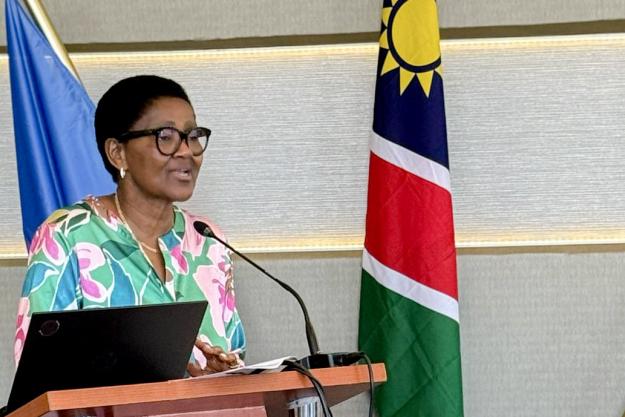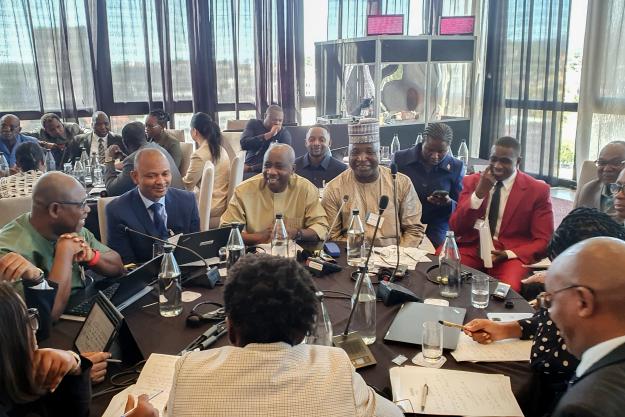Senior government officials and legal experts from across Africa gathered in Namibia on 28 and 29 April 2025 for a landmark regional conference to accelerate the adoption of comprehensive national legislations to implement the Chemical Weapons Convention (CWC).
The two-day event, jointly organised by the Organisation for the Prohibition of Chemical Weapons and the Government of Namibia, brought together delegates from 23 African countries that have yet to fully enshrine the CWC's requirements into their domestic legal systems. It featured an innovative and unique approach, including fostering the capacities of representatives in areas of advocacy for passing legislation and the dynamics of parliamentary proceedings.
Addressing delegates during the opening session, Namibia's Deputy Prime Minister Natangwe Ithete remarked, "As Member States to the Convention, we all have collective responsibility to uphold the international norm against the development, production, stockpiling and use of chemical weapons established under the Convention. Signing and ratifying the CWC commits countries to the verified destruction of all stockpiles of chemical weapons."
There is near-universal adherence of African countries to the CWC, which bans the development, production, stockpiling, and use of chemical weapons. However, almost half still need to enact the robust national laws required for full compliance. As of July 2024, 18 out of the 52 African States Parties to the Convention still lack any national implementing legislation, while nine others have only partially addressed the Convention's obligations in their legal frameworks. The OPCW is working with national authorities in the region to bridge these gaps.

OPCW Deputy Director-General, Ambassador Odette Melono, addresses senior officials at an African regional conference to accelerate the adoption of national legislation related to the Chemical Weapons Convention held in Namibia on 28 and 29 April 2025.
"Your presence here is evidence of the commitment of your countries to the Chemical Weapons Convention," OPCW Deputy Director-General Ambassador Odette Melono told delegates during the opening session. "The States Parties represented here share a mutual understanding that a world free of chemical weapons can only be achieved if all countries implement the Convention and fulfil their obligations."
At present, citizens in more than half of African countries are not fully protected against the threat of chemical weapons due to lacking legislation, Ambassador Melono remarked. These countries "could unknowingly become safe havens for illicit and prohibited activities."
The absence of comprehensive legislation is widely recognised as leaving countries vulnerable to the misuse of toxic chemicals and undermining global non-proliferation efforts. Porous borders, new and emerging technologies, varying capacities to exercise control and threats by non-state actors present a unique set of challenges for African States Parties in that context.
During the conference in Namibia, the OPCW's Technical Secretariat worked with these countries to help address the range of challenges that remain to the full enactment of the Convention.
The event featured thematic discussions, case studies, and breakout sessions designed to help participants share experiences, identify challenges, and learn from best practices. Topics included strategies for stakeholder mobilization, advocacy and communication, and the intersection of CWC implementation with broader chemical security and United Nations Security Council obligations. The programme also featured numerous opportunities for delegates to share the latest updates on the status of their national legislation, information that is crucial to tailoring OPCW assistance and maximising its effectiveness.

Senior officials participate at an African regional conference to accelerate the adoption of comprehensive national legislation related to the Chemical Weapons Convention in Namibia on 29 April 2025.
Alongside government delegations from African countries still striving towards full CWC implementation, the conference included representatives from countries with successful CWC legislation, as well as experts from international and regional bodies such as the African Union, UN Security Council Resolution 1540 Committee and the UN Office on Drugs and Crime, under the leadership of the OPCW.
The conference was also a component of the OPCW Africa Programme, a special initiative by the Technical Secretariat to respond to the particular needs and priorities of African Member States in their endeavour to comprehensively and effectively implement the Convention.
The OPCW's ongoing international cooperation and capacity-building initiatives including for legislation have already benefited a large number of professionals from Africa. However, additional targeted assistance and cooperation is still needed to bridge the remaining gaps.
"As we pursue our mission, we do so in an increasingly fragile security environment. Today, the international disarmament architecture is under unprecedented pressure," Ambassador Melono remarked to assembled delegates. The full implementation of the Convention "is a journey whose completion requires persistence and stamina."
Background
As the implementing body for the Chemical Weapons Convention, the OPCW, with its 193 Member States, oversees the global endeavour to permanently eliminate chemical weapons. Since the Convention's entry into force in 1997, it is the most successful disarmament treaty eliminating an entire class of weapons of mass destruction.
In 2023, the OPCW verified that all chemical weapons stockpiles declared by the 193 States Parties to the Chemical Weapons Convention since 1997 - totalling 72,304 metric tonnes of chemical agents - have been irreversibly destroyed under the OPCW's strict verification regime.
For its extensive efforts in eliminating chemical weapons, the OPCW received the 2013 Nobel Peace Prize.






